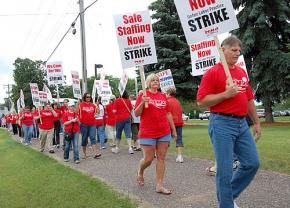Minn. nurses on the picket line
, a registered nurse in Chicago and member of National Nurses United, reports on the issues behind a 24-hour strike at 14 Minnesota hospitals.
A FEW weeks ago, someone at the hospital where I work left out an advertisement from Healthsource Global Staffing, which was looking for "replacement nurses in a labor dispute." After depositing the flyer in the garbage where it belonged, I didn't give it much thought--until it became clear why they were so desperate to find scabs.
The largest-ever strike by registered nurses took place in Minnesota on June 10, with 12,000 RNs walking out and picketing 14 hospitals for 24 hours. The nurses are represented by the Minnesota Nurses Association (MNA), an affiliate of the newly formed National Nurses United (NNU).
The MNA contract expired on May 19, and this is the first time nurses in the Twin Cities have ever worked without one. Management has been stonewalling in negotiations over issues of pensions and staffing. The hospital has proposed to reduce future pension payments by a third, and give miniscule raises, both of which the union has rejected.
"This phenomenon is not just in Minnesota," NNU Co-President Jean Ross told Medscape Medical News. "In this recession, employers expect everybody to sacrifice whether there's a need to or not, or whether it's prudent or not, and it always comes on the backs of nurses. This union is prepared to do what it needs to do to get its needs met. What's good for nurses is good for patients."

According to Forbes.com, "About the same number of nurses had wanted a simultaneous strike in California over the same issues, but were blocked temporarily earlier this week by a San Francisco judge."
THE UNION'S central demand has been around issues of safe staffing, regulating how nurses are floated to other units and nurse-to-patient ratios.
Mandated nurse-to-patient ratios are a high priority of the NNU. A recent study explicitly examined legislation in California, the only state that mandates ratios, and compared their patient outcomes to two other states. It found that patients in California had lower inpatient mortality, backing up the already logical idea that more nurses equals less deaths.
Unfortunately for patients, the hospital industry is more interested in profit margins than mortality rates. Health care employers call it "flexibility," but it's really about squeezing every nurse by piling on more patients until a breaking point is reached. Unlike speedups in most other industries, where workers alone bear the brunt of the suffering, the "product" in the health care industry is a human being, so the outcome is doubly disastrous.
The situation is further complicated by Barack Obama's new health care reform legislation, which aims to cut health care costs. According to the Congressional Budget Office, hospitals alone are expected to cut $113 billion of the $196 billion in total savings mandated by the bill over the next decade.
As usual, health care institutions first want to take it out of our salaries and pensions before anyone even glances at their executive compensation or stock dividends.
With an anemic economy, funding has become tighter overall. Combine this with a reform bill coming down the pike, and future confrontations such as this will become necessary. At stake is not just the livelihood and conditions of health care workers, but the quality of care that patients will receive.
It's clear that fighting back and organizing is what we need to do. The recent win at Temple University Hospital demonstrated that we can beat back the employers' offensive. A 28-day strike by 1,500 health care workers represented by the Pennsylvania Association of Staff Nurses and Allied Professionals succeeded in holding the line on benefits and provided wage increases. NNU has also had recent victories in Texas, organizing more than 1,900 nurses in a right-to-work state.
After the one-day walkout in the Twin Cities, it's unclear where things will go from here, and if another longer strike will be necessary to win safe staffing ratios. One nurse who was also part of the 1984 strike was asked that very question and told the media: "Then we'll have to do it again."


